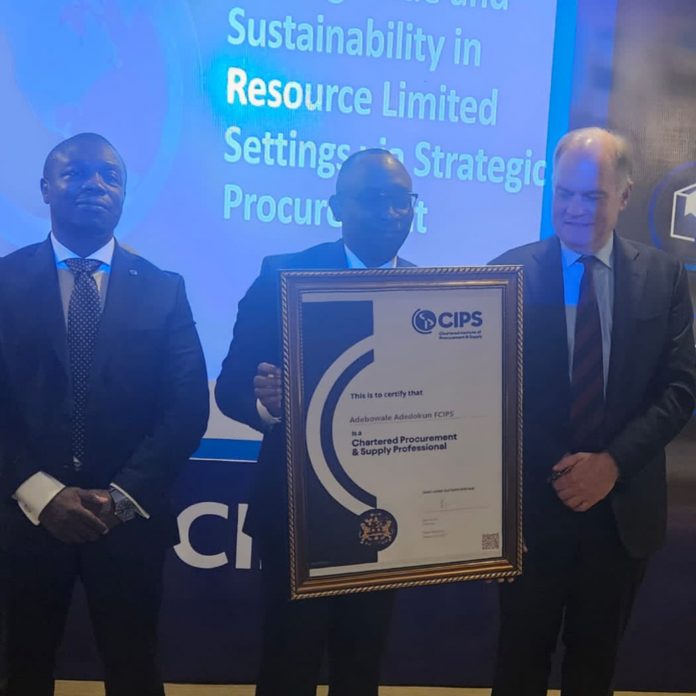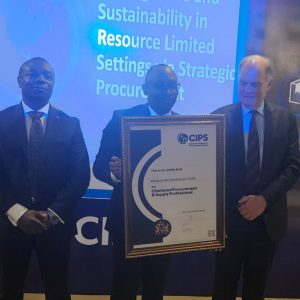DG BPP, Dr Adebowale Adedokun [middle] holding his certificate as a Chartered Procurement and Supply Professional from the CIPS.
By Our Reporter
Director General of Bureau of Public Procurement, BPP, Dr Adebowale Adedokun, on Tuesday, told Nigerians to spare President Bola Tinubu as well as the State Governors and, in their steads, hold him and all procurement officers responsible if government at all levels failed to deliver road and other infrastructure projects due to procurement lapses.
Adedokun spoke in Abuja at the high-impact educational symposium organised by the Chartered Institute of Procurement and Supply [CIPS], Nigeria Branch, with the theme: “Driving Value and sustainability in resource-limited settings via strategic procurement”, at which CIPS Global CEO, Ben Farrell, MBE, served as a panellist.
He said that globally, professionals helped politicians to implement their governance objectives on the plank of the pieces of pofessional advice given to public office holders by the Procurement Bureau and certified procurement officers.
“So, where I fail in giving the requisite professional advice that would conduce to effective implementation or execution of projects, then I should be held accountable. I am saying today that all procurement officers in Nigeria who give the wrong advice to their superior would be held accountable.
“The accounting officers are also going to be held accountable for failure to implement government objectives. This applies to other tiers of government. This is the reason we are working closely with the anti-corruption agencies to ask them to hold everybody accountable.”
Adedokun, who, on the occasion of the symposium, was certified as a chartered Procurement and Supply Professional [making him the 913th fellow of the CIPS Global], said that in the BPP resolve to be held accountable, the Bureau had undercored the necessity of training.
According to him, “To do that, give them [procurement officers] knowledge, empower them, give them skill. You do not judge somebody who does not know. So the first thing BPP is doing is to build capacity, provide online training through the Sustainable Procurement, Environmental and Social Standards Enhacement [SPESSE] project, and provide hands-on training. All these are avenues because we have lost ten years and we need to make up.
“There are massive projects going on, but where are the skills, who are the professionals, where are the engineers? We know now that BPP is going to bring together core professionals in every sector so that we can monitor and evaluate progress and also report to Mr. President that things are being done rightly or wrongly.
“If things are being done wrongly, we will recommend to him in line with the provisions of the Public Procurement Act 2007 appropriate discipline for anybody who causes government to lose money. That is the way we are moving and collectively we can make Nigeria the Dubai of Africa.”
Meanwhile, in a post-symposium interview by journalists, Adedokun said that the government of President Tinubu through the BPP would reduce bureaucracy in procurement by going digital.
According to him, “We are going to do it in such a way that it grows from small, medium scale to massive projects. So that is the way to go: to make sure that across the entire country, opportunities are created to do business.
“This is the time to grow our local industries. We want to use procurement to grow the local industries.
“Young men will be given opportunities to win contracts, develop their talents and stop the JAPA syndrome. So, what I can assure Nigerians, and by the effort of Mr President, is that we are committed to use this procurement not just to award contract but as a tool for economic development and national growth, giving opportunities across all strata including women, people living with disabilities and the teaming youths so that they can make impact.”
In his opening remarks, Northern Coordinator of CIPS Nigerian Branch, Ambassador Daniel Etameta, said CIPS was stepping into a vital moment of strategic decisions to help impact the national economy.
He said the theme of the symposium was both timely and vital as it spoke to the reality of the state of procurement and “the value we must add to it.”
Etameta noted the failure of systems and not just logistics, stressing that procurement was about value for life and not just for money.
“It is about sustainable systems, reduction of waste and strengthening of the supply chain,” he added.
He hailed the BPP DG for the reforms of procurement processes in Nigeria through his visionary leadership, which he prayed would endure to elevate the procurement ecosystem.


